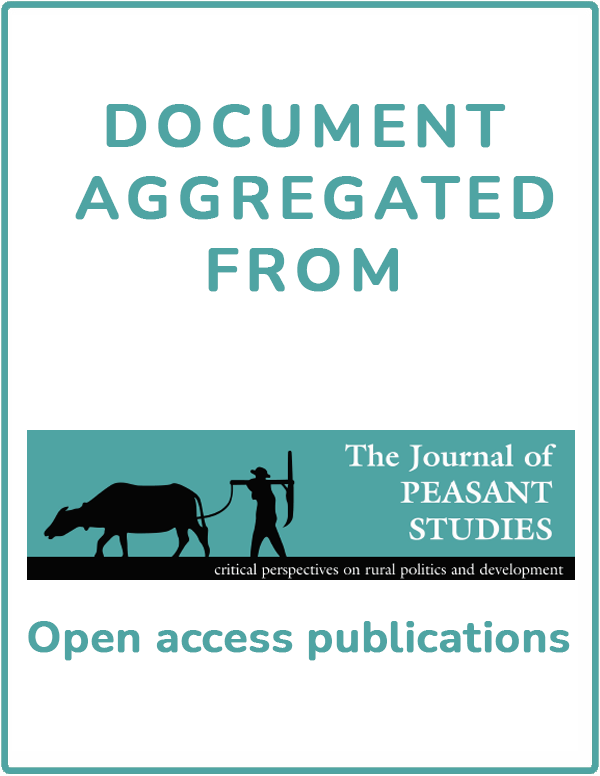Location
A leading journal in the field of rural politics and development, The Journal of Peasant Studies ( JPS) provokes and promotes critical thinking about social structures, institutions, actors and processes of change in and in relation to the rural world. It fosters inquiry into how agrarian power relations between classes and other social groups are created, understood, contested and transformed. JPS pays special attention to questions of ‘agency’ of marginalized groups in agrarian societies, particularly their autonomy and capacity to interpret – and change – their conditions.
The Journal encourages contributions from across the social sciences which:
-
question mainstream prescriptions;
-
interrogate orthodoxies in radical thinking;
-
explore theoretical, policy and political alternatives.
The Journal welcomes contributions on a wide range of contemporary and historical questions and perspectives related to rural politics and development; on issues that confront peasants, farmers, rural labourers, migrant workers, indigenous peoples, forest dwellers, pastoralists, fisherfolk and rural youth – both female and male – in different parts of the world.
In addition to articles and special issues, the Journal publishes Grassroots Voices – views that are written and presented in a non-academic style but provide important insights and information relevant to critical rural development studies; and Reviews of important theoretical or policy-oriented books or films written for diverse audiences. For more information about Grassroots Voices and Reviews, see here.
JPS was founded in 1973 on the initiative of Terence J. Byres and its first editors were Byres, Charles Curwen and Teodor Shanin who are among the most important agrarian political economists.
Members:
Resources
Displaying 16 - 20 of 21Green Grabbing: a new appropriation of nature?
Across the world, ‘green grabbing’ – the appropriation of land and resources for environmental ends – is an emerging process of deep and growing significance. The vigorous debate on ‘land grabbing’ already highlights instances where ‘green’ credentials are called upon to justify appropriations of land for food or fuel – as where large tracts of land are acquired not just for ‘more efficient farming’ or ‘food security’, but also to ‘alleviate pressure on forests’.
An overview of Fast Track Land Reform in Zimbabwe: editorial introduction
No Abstract
Changing agrarian relations after redistributive land reform in Zimbabwe
Redistributive land reform and agrarian reforms since 2000 progressively changed some of Zimbabwe's agrarian relations, particularly by broadening the producer and consumption base. However they fuelled new inequities in access to land and farm input and output markets. These complex structural changes are explored using a series of surveys, secondary sources and official documents. Findings show that exploitative agrarian labour practices continue despite the diversification of labour towards numerous farms and other enterprises.
New frontiers of land control: Introduction
Land questions have invigorated agrarian studies and economic history, with particular emphases on its control, since Marx. Words such as ‘exclusion’, ‘alienation’, ‘expropriation’, ‘dispossession’, and ‘violence’ describe processes that animate land histories and those of resources, property rights, and territories created, extracted, produced, or protected on land. Primitive and on-going forms of accumulation, frontiers, enclosures, territories, grabs, and racializations have all been associated with mechanisms for land control.
Three decades of agrarian reform in Zimbabwe
This article examines the empirical facts about the actual outcome of Zimbabwe's land reform, based on years of field research. It shows that the popular assumption about failed land reform in Zimbabwe is wrong on several counts: the character of Zimbabwe's land reform has been redistributive, and the extent of this has been wide enough to trigger significant progressive changes in the agrarian structure. This is despite some elites having benefited from the process and foreign-owned agro-industrial estates and conservancies being retained.



